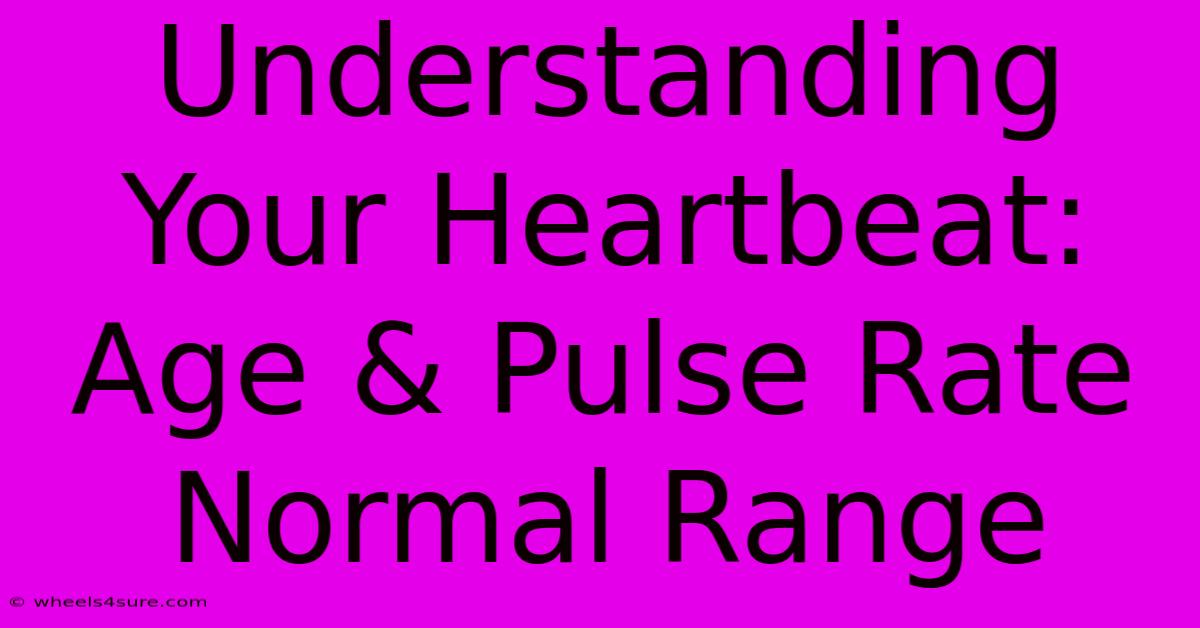Understanding Your Heartbeat: Age & Pulse Rate Normal Range

Table of Contents
Understanding Your Heartbeat: Age & Pulse Rate Normal Range
Knowing your heart rate and understanding what's considered normal is crucial for maintaining good health. Your pulse, the rhythmic throbbing of your arteries caused by your heart's contractions, provides a valuable window into your cardiovascular system. This article will help you understand your heartbeat, exploring the normal pulse rate ranges for different age groups and factors that can influence it.
What is a Normal Heart Rate?
A normal resting heart rate varies depending on several factors, most significantly age. Generally, a lower heart rate indicates greater fitness and cardiovascular efficiency. However, what's considered "normal" is a range, not a single number.
Resting Heart Rate: This is your pulse when you're relaxed and haven't been physically active for at least 30 minutes. You can check your pulse at your wrist (radial artery) or neck (carotid artery). Count the beats for 60 seconds to determine your beats per minute (BPM).
Normal Heart Rate Ranges by Age
The following chart provides approximate normal resting heart rate ranges for different age groups. Remember, these are averages, and individual variations are common. Always consult your doctor if you have concerns about your heart rate.
| Age Group | Normal Resting Heart Rate (BPM) |
|---|---|
| Infants (0-1 year) | 70-190 |
| Children (1-6 years) | 65-110 |
| Children (6-10 years) | 70-110 |
| Children (10-14 years) | 60-100 |
| Adults (18-60 years) | 60-100 |
| Adults (over 60 years) | 50-90 |
Note: These are averages. Athletes often have significantly lower resting heart rates.
Factors Affecting Heart Rate
Several factors beyond age can influence your heart rate. These include:
- Physical Activity: Exercise increases your heart rate. Immediately after exercise, your heart rate will be elevated, gradually returning to your resting rate as you recover.
- Medication: Certain medications, such as beta-blockers, can lower your heart rate. Others can increase it.
- Stress and Anxiety: Stress hormones can elevate your heart rate. Anxiety attacks can cause dramatically increased heart rates.
- Dehydration: Dehydration can lead to an increased heart rate as your body works harder to circulate blood.
- Temperature: Both extreme heat and cold can affect heart rate. Heat can increase it, while extreme cold can initially increase it, then potentially decrease it.
- Body Position: Standing up quickly can cause a temporary increase in heart rate.
- Underlying Medical Conditions: Several medical conditions, including heart disease, thyroid problems, and anemia, can affect your heart rate.
When to See a Doctor
While variations in heart rate are common, it's important to seek medical attention if you experience:
- Persistently high heart rate (tachycardia): A heart rate consistently above 100 BPM at rest.
- Persistently low heart rate (bradycardia): A heart rate consistently below 60 BPM at rest (though this can be normal for some individuals, especially athletes).
- Irregular heartbeat (arrhythmia): A heart rhythm that is erratic or skips beats.
- Dizziness or lightheadedness associated with changes in heart rate.
- Chest pain or discomfort.
- Shortness of breath.
Regular check-ups with your doctor are important for monitoring your overall health, including your heart rate. They can provide personalized advice and assess any potential concerns.
Monitoring Your Heart Rate: Tips and Tools
Regularly monitoring your heart rate can help you understand your body's response to different activities and identify potential issues early on. Here are a few simple methods:
- Manual Pulse Check: The most basic method, using your fingers to feel your pulse at your wrist or neck.
- Heart Rate Monitors: Wearable fitness trackers and smartwatches often include heart rate monitoring capabilities.
- Heart Rate Apps: Many smartphone apps can measure your heart rate using your phone's camera.
Understanding your heart rate is a vital step towards maintaining your cardiovascular health. By paying attention to your pulse and knowing your normal range, you can better monitor your well-being and seek medical attention when necessary. Remember to consult with your doctor for personalized advice and guidance.

Thank you for visiting our website wich cover about Understanding Your Heartbeat: Age & Pulse Rate Normal Range. We hope the information provided has been useful to you. Feel free to contact us if you have any questions or need further assistance. See you next time and dont miss to bookmark.
Featured Posts
-
Step Family Life Words Of Wisdom And Encouragement
Apr 12, 2025
-
Vedang Rainas Dad A Fathers Unwavering Support
Apr 12, 2025
-
Que Son Los Tiroides Overcoming Thyroid Challenges
Apr 12, 2025
-
Sanjay Bangars Son The Untold Story Of His Success
Apr 12, 2025
-
Dragon Age Veilguard Your Journey Begins
Apr 12, 2025
